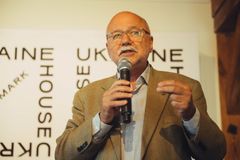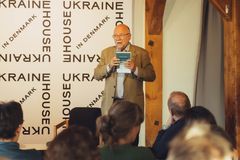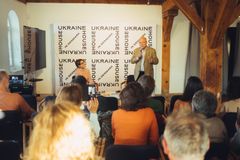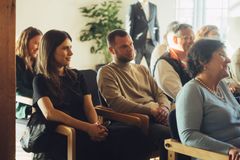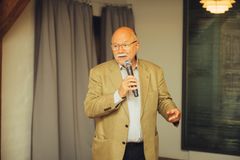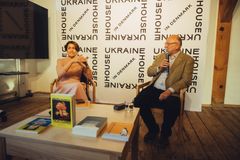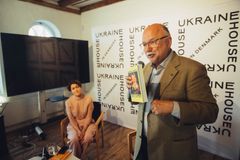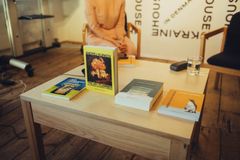“... when you have a real tragedy in front of your eyes, ... you cannot invent a more tragic story than life can produce. I couldn’t write fiction for two and a half years.” Ukraine House hosts conversation with Andrei Kurkov
On May 2, Ukraine House in Denmark hosted a literary evening with Andrei Kurkov, one of Ukraine's most prolific and internationally recognized authors. The writer shared his personal reflections on becoming an author under the Soviet regime and the impact of war on national identity and contemporary literature.
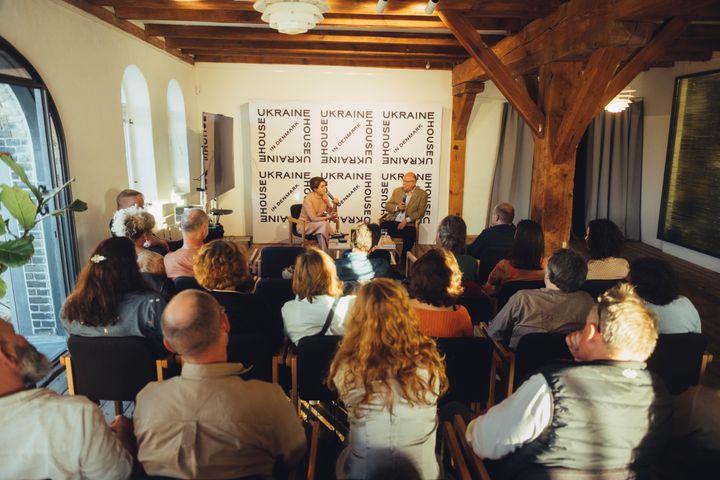
Kurkov transported the audience back to his childhood in Soviet Ukraine, where laughter was both a weapon and a refuge. He described late‐night gatherings in cramped apartments, where political dissent mixed with cups of port wine. These clandestine salons offered a rare taste of freedom under an oppressive regime. It was in that atmosphere that he first discovered the power of words to subvert authority and connect people. Those jokes arrived with illicit manuscripts, teaching him that ideas can travel even when borders and authorities forbid them. These engagements with secretive satirical culture became a formative experience that laid the groundwork for a lifetime devoted to truth‐telling through fiction.
By the late 1970s, Kurkov started competing in secret joke-telling contests in Crimea. He recounted the thrill of standing before an audience of intellectual dissidents, each story weighed and tallied. These two-week gatherings near Sudak were as much about solidarity as they were about satire. Winning those contests meant claiming a momentary triumph over authoritarian fear: “I started reading illegal literature and satire which I enjoyed very much. […] In 1977-78, my brother and I twice took part in illegal joke-telling competitions in Crimea. People from all over the Soviet Union — intellectuals and anti-Soviets — gathered near Sudak for two weeks, telling jokes, counting who told how many jokes, drinking wine. We won once.”
He felt empowered to translate that satirical spirit into prose. Yet his early manuscripts, dark and cynical, confronted the wall of Soviet literary orthodoxy: “I never managed to become a Soviet writer because what I wrote was funny, was black, was a bit cynical. […] When I showed my text to different Soviet publishers, they were saying it is not Soviet literature.” There was even a situation, where he was almost ready to give up and betray his humor, when a Communist Party-affiliated publishing house employee promised him to ensure his humourless short stories would be published if he was to marry her. “I decided that was too much of a betrayal — as I would have to write short stories which I didn’t want to write and marry someone I didn’t want to marry — so I refused and my book was not published. And I’m very happy I never published those short stories because they were written as a form of compromise between censorship and myself.”
Kurkov then spent eighteen years smuggling manuscripts through Poland until a Swiss publisher finally recognized his talent. The acceptance of Death and the Penguin brought him from underground dissident to European bestseller.
With creative freedom secured, Kurkov turned his pen to Ukraine’s harsh reality, traveling in 2015 for the first time to the 430-kilometer “gray zone” where civilians lived under constant threat. He recounted elderly villagers cut off from all services, choosing to face bombardment rather than flee. Their quiet endurance became the heart of his frontline chronicles: “There were dozens of villages — some with only two or three people living, old people — no electricity, no gas, running water, medical help, no police, no authority. They were abandoned, and mostly these were the old people… it was easier to imagine that they are killed at home than that they have to travel and nobody knows who will help them.” This experience became the foundation of one of his bestseller, “Gray Bees”, where a lone beekeeper stranded in the “gray zone” between Ukrainian and Russian military positions who rigs his hives against shellfire and smuggles his bees to Crimea, finds his old Crimean Tatar friend and reconnects with a land and people torn from Ukraine.
Now, in times of Russia’s full-scale invasion of Ukraine, Kurkov also observed that many of his fellow writers have abandoned fiction for non-fiction: “Writers are different but what happened to most of them — almost everybody stopped writing fiction. Because when you have a real tragedy in front of your eyes, you understand that [...] you cannot invent a more tragic story than life can produce. I couldn’t write fiction for two and a half years.” Therefore, the incentive for the writers became to use diaries and articles to actually explain, especially abroad, what is happening and to encourage empathy to secure support.
Amid that shift, Kurkov still highlighted poetry’s importance in the frontlines. He described listening to a poetry reading for soldiers in a remote field hospital: “In the first year of the full-scale invasion, poetry became extremely important. Poets were visiting soldiers and reciting their poems, and I went a couple of times — I saw like two hundred soldiers crying because a lady poet recited a poem about a mother. Everybody immediately relates to his own family, to his own life before the war. This emotional charge helps them to forget about horrors — but still, they are crying even now, because Ukrainian poets are still visiting soldiers not far away from the front line.”
Kurkov further warned of a looming “black hole” in Ukrainian literature as more and more poets are being killed in war. Those who survive will inherit the task of filling this void: “We have more than 120 poets and writers who are killed in the war. […] There will be several years of emptiness, a black hole in Ukrainian literature. Those who survive will have to write much more to fill this gap.”
Even though Russia is trying its best for Ukrainians to lose hope and live in constant fear and anxiety, Kurkov, as a writer and an intellectual, remains unflinchingly committed to hope and believes that people need a happy end because books give energy and hope. For him, he “writes for people who believe that life is good, who love life”, because life is good, even when there is so much darkness around.
Ukraine House in Denmark extends its deepest gratitude to Andrei Kurkov for sharing his journey and belief in literature’s power to uplift and inspire.
Keywords
Images
About Ukraine House
The Ukraine House in Denmark is a civil society organisation of Ukrainian cultural diplomacy based in Copenhagen. Its mission is to form an enduring positive influence of Ukraine on Ukrainian-Danish cooperation, security, and lasting peace in Europe.
Subscribe to releases from Ukraine House in Denmark
Subscribe to all the latest releases from Ukraine House in Denmark by registering your e-mail address below. You can unsubscribe at any time.
Latest releases from Ukraine House in Denmark
An exhibition by Mariia Kulykivska, “My Body is a Battlefield. Copenhagen”, opens in Copenhagen — a powerful artistic manifesto about the body’s memory, war, and rebirth3.12.2025 08:00:00 CET | Pressemeddelelse
On November 18, an open-air exhibition by Ukrainian artist Mariia Kulykivska — a continuation of her long-term project “My Body is a Battlefield” — opened along the Copenhagen waterfront. The event was organized by the contemporary art platform Spilne Art in cooperation with the Ukraine House in Denmark.
Ukraine House in Denmark Presents “My Body is a Battlefield. Copenhagen” by Mariia Kulykivska13.11.2025 08:00:00 CET | Presseinvitation
Ukraine House in Denmark, in collaboration with Spilne Art, presents a new chapter of Ukrainian artist Mariia Kulykivska’s long-term project — My Body is a Battlefield. Copenhagen. The open-air installation at the waterfront, located near Ukraine House, will run from November 18 to December 26.
Ukraine House in Denmark Opens "Coming Home for Christmas" Exhibition10.11.2025 08:00:00 CET | Presseinvitation
November 29, 2025 — February 1, 2026 Ukraine House in Denmark invites residents and guests of Copenhagen to experience the warmth and magic of Ukrainian Christmas at the exhibition “Coming Home for Christmas”.
Ukraine House i Danmark afholder debat om afslutningen på russisk kolonialisme21.10.2025 14:55:47 CEST | Pressemeddelelse
København, 22. september 2025 – Ukraine House i Danmark afholdt i samarbejde med Udenrigspolitisk Selskab og Free Nations of Post-Russia Forum en paneldebat om afslutningen på russisk kolonialisme. Arrangementet samlede internationale eksperter, beslutningstagere og ledelsesrepræsentanter for civilsamfundet til en drøftelse af Ruslands imperiale tilbagegang og nødvendigheden af at forberede sig på dens konsekvenser. Debatten blev modereret af Nataliia Popovych, formand for Ukraine House i Danmark, og panelet bestod af Charlotte Flindt Pedersen (Udenrigspolitisk Selskab), Jacob Kaarsbo (analytiker i efterretnings- og sikkerhedspolitik), Juraj Mesík (Slovakisk Udenrigspolitisk Selskab), Yaroslav Yurchyshyn (medlem af det ukrainske parlament), Oleg Magaletskyi (Free Nations of Post-Russia Forum) og Mette Skak (forsker i russisk udenrigs- og sikkerhedspolitik).
Post-Release: Myroslav Marynovych om mod, samvittighed og konfrontationen med nutidens Rusland6.10.2025 10:45:03 CEST | Pressemeddelelse
København, Danmark – Den 5. september havde Ukraine House i Danmark den ære at være vært forMyroslav Marynovych, en vigtig dissident, medstifter af den Ukrainske Helsingforsgruppe, Gulag-overlever og prorektor ved det Ukrainske Katolske Universitet. Arrangementet kastede lys over modet hos Ukraines menneskerettighedsforkæmpere i 1960’erne og 70’erne – en generation, der modsatte sig den sovjetiske totalitære maskine, på et tidspunkt hvor næsten ingen troede, det var muligt.
In our pressroom you can read all our latest releases, find our press contacts, images, documents and other relevant information about us.
Visit our pressroom
